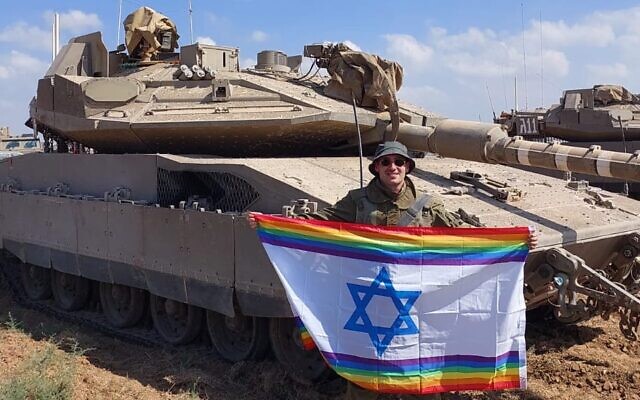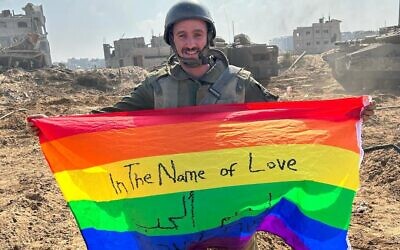Israeli LGBTQ soldiers hope the war in Gaza will bolster their fight for equal rights at home
Polls show that a majority of Israelis favour affording LGBTQ citizens with fully equal treatment, but Orthodox parties have consistently opposed efforts to expand LGBTQ rights,

One month after his fiancee was killed in the Israeli military’s Oct. 7 battle against Hamas terrorists in Kibbutz Be’eri, Omer Ohana received a small bit of solace: His government passed a bill granting recognition to same-sex partners of fallen soldiers.
“My love! From this day forward I am an IDF widower,” he wrote from the Knesset gallery, where he witnessed the passage of the bill, for which he had campaigned.
“It is a description I would give anything in the world to give up, a title that in my life I never thought I would receive six days before we were supposed to get married, when you left to save lives and rescue families held captive in Be’eri,” wrote Ohana, to his fiance, Sagi Golan. “You fell in battle against cruel terrorists and today, in your honor, we received equality in death. Now we will continue to demand equality also in life.”
That sentiment has become a rallying cry among Israel’s LGBTQ soldiers, many of whom feel the war has placed their status in stark relief: They have been called to risk their lives on the front lines in Gaza but are denied rights afforded to heterosexual couples at home — including the right to wed in Israel. Opposition to same-sex marriage comes in large part from religious political parties, many of whose haredi Orthodox constituents do not serve in the military.
One call for LGBTQ rights in Israel went viral in November, when IDF soldier Yoav Atzmoni posted a photo of himself in uniform in Gaza, holding a Pride flag inscribed with the words “In the name of love” in English, Arabic and Hebrew.

Atzmoni hoped “to show the Israeli community that we are equal in the way we pay our debts, and I hope after the war we receive our rights,” he told the Jewish Telegraphic Agency.
“There are those in the governing coalition whose kids are in yeshiva or in Miami,” he added, referring to the haredi parties as well as Yair Netanyahu, the son of the prime minister, who recently returned from Florida. “While those from the opposition who support LGBTQ civil rights are sending their kids to Gaza.”
Atzmoni also hoped to convey the message that the IDF “is the only army in the Middle East in which we can live outside of the closet.” That’s been the case since 1993, when Israel began allowing openly gay and lesbian soldiers to serve.
Homophobia is still an issue in the IDF — a 2017 survey by an Israeli LGBTQ youth group found that 95% of LGBTQ soldiers it polled had encountered discrimination while serving. But a report by the Aguda, Israel’s leading LGBTQ organisation, found that only 1% of the reported incidents of homophobia it tallied in 2021 occurred in the military.
And barriers continue to fall: The first Israeli transgender woman soldier to fight in Gaza was recently interviewed by Channel 13, a major network.
“There is no doubt that the IDF is one of the more progressive organisations in Israel regarding their acceptance of LGBTQ people, but even in progressive places there are still cases of discrimination,” said Hila Peer, the Aguda’s chairwoman. “I do not expect them to be perfect in spite of all the work that has been done to be more inclusive.”
She added that prior to the November passage of the law granting equal rights to LGBTQ military widows, “there was a de facto policy in the army to recognise such partners in practice and I think that this says a lot.”
Polls show that a majority of Israelis favour affording LGBTQ citizens with fully equal treatment, but Israel’s Orthodox political parties, which are allied with Prime Minister Benjamin Netanyahu, have consistently opposed efforts to expand LGBTQ rights, citing prohibitions on same-sex relations in traditional Jewish law. In an interview in June, months before the current war broke out, haredi lawmaker Yitzhak Pindrus said the LGBTQ community is “the most dangerous thing for the State of Israel, more than ISIS and Hezbollah.”
LGBTQ Israelis have achieved victories in the courts. Like others who are unable to legally wed in Israel, they can get married abroad and have those marriages recognised by the government. Last year, due to another court ruling, same-sex couples and single men became able to have children via surrogacy in Israel — something Ohana and Golan had hoped to do. And last week, the Israeli Supreme Court ruled that same-sex adoption must be allowed. But Peer believes it should not be up to the courts to make such changes.
“The adoption law could have been fixed legislatively, as the only problem was with the language of the law, [which said] ‘a man and his wife,’” she said. “The government did not agree to amend the law so we had to appeal to the High Court and wait for it to fix the law, which happened last week, but these are processes that take many years.”
In the context of that debate, Asaf, a reservist who serves in a unit focused on Israel’s Iron Dome missile defence system, felt gratified to see Atzmoni wave the pride flag in the context of an Israeli war.
“It was very exciting and heartwarming I have to say,” said Asaf, who gave only his first name, citing military regulations. During Israel’s last ground invasion of Gaza, in 2014, he said, “it was not as visible… He sent the message that I am fighting in Gaza, and I am gay, and I can wave the Pride flag like the flag of Israel.”
Israel has boasted of its LGBTQ soldiers, with an official social media account sharing a photo of a gay soldier getting engaged last month. But critics of Israel have said that the country’s trumpeting of its LGBTQ freedoms amounts to “pinkwashing,” a tactic to distract from the country’s human rights record and mistreatment of Palestinians.
While Israeli Jews broadly support the war effort, some members of Israel’s LGBTQ community echoed that critique, and said they did not appreciate seeing the Pride flag on the battlefield.
“In the name of love we shell, dehydrate and starve the people of Gaza; in the name of love one and half million people are uprooted… In the name of love more than 10,000 civilians, among them thousands of children, are dying,” Israeli trans activist Tamar Ben David wrote in a Facebook post that received a stream of comments that were also critical of Atzmoni’s photo.
Other LGBTQ Israelis say that they haven’t focused on their battle for civil rights during wartime. On Israel’s northern border, where Israel is bracing itself for a wider conflict with the Lebanese terror group Hezbollah, Carmel, an IDF medic, says he is “very much in my service.”
“Here in the north, there are a lot of explosions, anti-tank missiles, and combat from the air,” he said. “We are trying to take care of ourselves and guard the kibbutz that was evacuated, and protect the country.”
Before the war broke out, LGBTQ rights were at the heart of fierce debate over the government’s campaign to weaken Israel’s courts. Asaf, the IDF soldier, fears that once the war ends, anti-LGBTQ attitudes will again prevail among the country’s leadership.
“Slowly we are seeing changes happen, even in the state, as people understand we are one community, but I am not optimistic because I see what is happening in the government, with people who do not support the community,” he said. “I want to believe that one day it will happen because it is the right thing to do, and it is a shame that some changes had to occur as a result of tragedy and war.”

Thank you for helping to make Jewish News the leading source of news and opinion for the UK Jewish community. Today we're asking for your invaluable help to continue putting our community first in everything we do.
For as little as £5 a month you can help sustain the vital work we do in celebrating and standing up for Jewish life in Britain.
Jewish News holds our community together and keeps us connected. Like a synagogue, it’s where people turn to feel part of something bigger. It also proudly shows the rest of Britain the vibrancy and rich culture of modern Jewish life.
You can make a quick and easy one-off or monthly contribution of £5, £10, £20 or any other sum you’re comfortable with.
100% of your donation will help us continue celebrating our community, in all its dynamic diversity...
Engaging
Being a community platform means so much more than producing a newspaper and website. One of our proudest roles is media partnering with our invaluable charities to amplify the outstanding work they do to help us all.
Celebrating
There’s no shortage of oys in the world but Jewish News takes every opportunity to celebrate the joys too, through projects like Night of Heroes, 40 Under 40 and other compelling countdowns that make the community kvell with pride.
Pioneering
In the first collaboration between media outlets from different faiths, Jewish News worked with British Muslim TV and Church Times to produce a list of young activists leading the way on interfaith understanding.
Campaigning
Royal Mail issued a stamp honouring Holocaust hero Sir Nicholas Winton after a Jewish News campaign attracted more than 100,000 backers. Jewish Newsalso produces special editions of the paper highlighting pressing issues including mental health and Holocaust remembrance.
Easy access
In an age when news is readily accessible, Jewish News provides high-quality content free online and offline, removing any financial barriers to connecting people.
Voice of our community to wider society
The Jewish News team regularly appears on TV, radio and on the pages of the national press to comment on stories about the Jewish community. Easy access to the paper on the streets of London also means Jewish News provides an invaluable window into the community for the country at large.
We hope you agree all this is worth preserving.





















